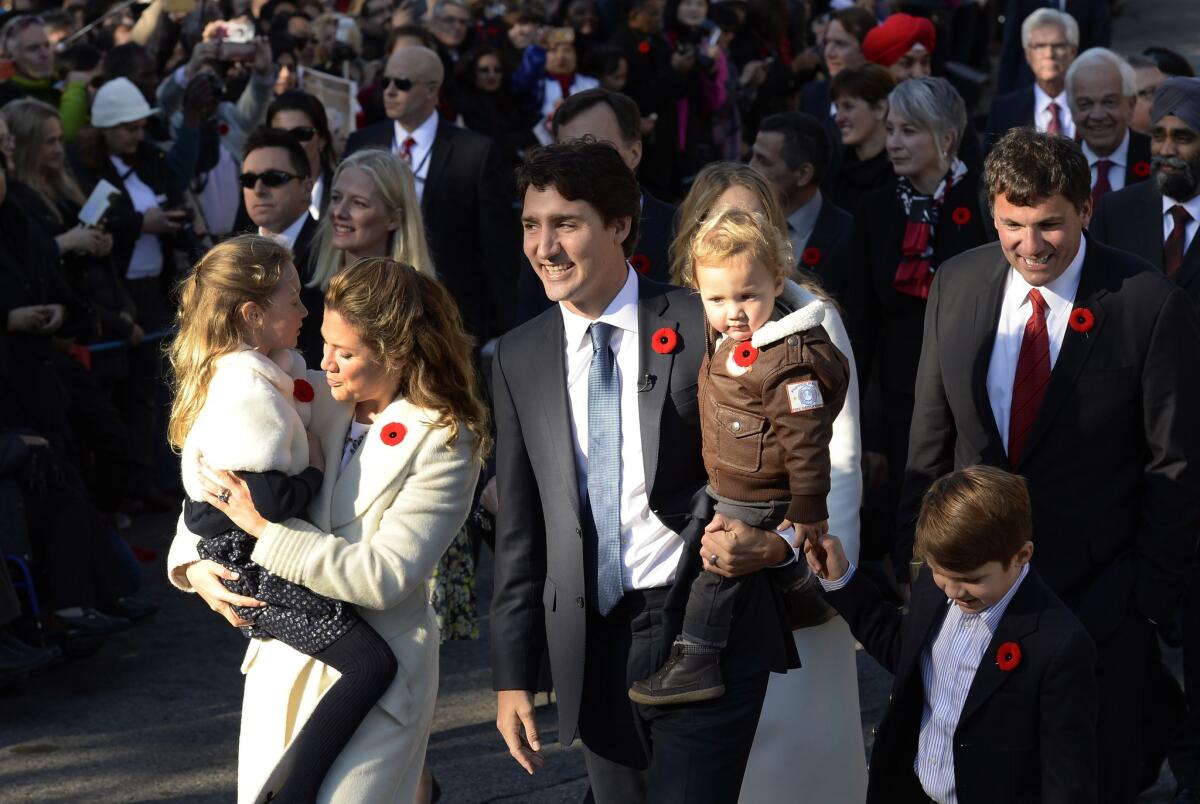Climate change among new Canadian Prime Minister Trudeau’s priorities

Liberal Party leader Justin Trudeau, his wife, Sophie Grégoire, and their children, Ella-Grace, Hadrien and Xavier, walk to Rideau Hall in Ottawa on Nov. 4 before his swearing in as Canada’s new prime minister.
- Share via
Reporting from Ottawa — Justin Trudeau, who was sworn in as Canada’s 23rd prime minister Wednesday, faces immediate challenges on issues including climate change, taxes, refugees and the fight against Islamic State militants.
During the unusually long 11-week election campaign that propelled the Liberal Party he leads to a majority government, Trudeau promised to bring 25,000 Syrian refugees to Canada by year’s end and establish “a pan-Canadian strategy” to tackle climate change within 90 days of the United Nations’ Conference of the Parties that begins in Paris this month.
Trudeau’s two-month goal to help ease the refugee crisis is significantly greater than the 2,000 Syrians his prime ministerial predecessor, Conservative Stephen Harper, planned to bring to Canada by the end of the year. But the Liberal target may be unrealistic, according to refugee resettlement groups that believe Trudeau might have to extend his timeline into next year.
In terms of climate change, Trudeau has invited federal opposition leaders and provincial premiers to join him at the Paris climate talks. Among his 30-member Cabinet is first-time Member of Parliament, Catherine McKenna, who will head the recently renamed Environment and Climate Change Department. That fresh approach could soften international criticism leveled against Canada in light of Harper’s decision to withdraw the country from the Kyoto climate-change accord almost four years ago.
On some issues, Trudeau has already signaled his stance. Under his watch, Canada is expected to end its yearlong combat mission against Islamic State in Iraq and Syria, which has involved more than 180 airstrikes launched by six Canadian CF-18 jets in the region.
Harjit Sajjan, a decorated lieutenant colonel in the Canadian Armed Forces and one of four Indo-Canadian Sikhs appointed to Trudeau’s Cabinet, is expected to oversee that withdrawal as the country’s new national defense minister. He will also be in charge of finding alternative replacement aircraft for Canada’s aging fleet of CF-18s while abandoning the previous Conservative government’s plan to purchase 65 Lockheed Martin F-35 stealth planes plagued by delays and billions of dollars in cost overruns.
Trudeau, the 43-year-old son of fabled Prime Minister Pierre Trudeau, took office after leading the Liberal Party from third place in the polls to election victory Oct. 19, forming a majority government with 184 of 338 House seats and ending Harper’s 91/2-year Conservative Party government.
The lingering cross-border irritant over the proposed Keystone XL pipeline may be over with the Trudeau government. Harper had said he would not “take no for an answer” from the Obama administration regarding the project to transport Alberta crude oil to U.S. Gulf Coast refineries, and Democratic presidential front-runner Hillary Rodham Clinton opposes the pipeline, but Trudeau has taken an approach somewhat in the middle. He supports it, as long as there is a stricter environmental review process.
On Wednesday, the U.S. State Department rejected a request from TransCanada Corp., the pipeline project’s sponsor, to delay its review of the presidential permit application pending the resolution of a dispute in Nebraska over a revised route through the state.
That topic could come up when Trudeau holds his first meeting as prime minister with Obama, when the two leaders attend the upcoming Group of 20 meeting in Turkey. The G-20 summit is part of a whirlwind global tour Trudeau will embark on this month that includes stops in Manila for the Asia-Pacific Economic Cooperation leaders’ meeting, and Malta, where he will join fellow Commonwealth heads of government at a summit presided over by Queen Elizabeth II, Canada’s head of state, before heading to Paris for the climate talks.
Upon his return to Canada, Trudeau plans to hit the ground running. He plans to recall Parliament on Dec. 3 followed the next day by a speech delivered by Gov. Gen. David Johnston that will outline the Liberal government’s legislative agenda over the next four years.
After taking the oath of office, Trudeau told reporters that his first legislative priority would be to introduce a tax cut for middle-income Canadians and raise taxes for the top 1% of income earners.
Much more work lies ahead. Trade deals involving the Trans-Pacific Partnership and the European Union need to be ratified. A unanimous Supreme Court of Canada ruling in February gave the federal government one year to craft a Canadian law that would allow physician-assisted suicide in cases involving an adult Canadian with a “grievous and irremediable medical condition” that causes “enduring” and “intolerable” suffering.
Trudeau has also committed to legalizing and regulating the use of marijuana and amending the Harper government’s controversial anti-terrorism legislation criticized for expanding the reach of law enforcement and security intelligence services at the expense of civil liberties.
“We’re a government that wants to earn Canadians’ trust by demonstrating that we trust Canadians,” Trudeau said outside Rideau Hall, the official residence of the governor general, Queen Elizabeth’s vice-regal representative, who presided over the swearing-in ceremony.
A crowd of about 3,500 people gathered on the grounds of the historic residence to witness the ceremony, heard those words directly from the man who, in his Oct. 19 election victory speech, spoke of how the “sunny ways” of “positive, optimistic” politics are not just a “naive dream.”
Guly is a special correspondent.
ALSO:
Houston voters reject LGBT equal rights measure
Airbnb wins the vote in San Francisco, but city’s housing debate rages on
Pentagon suspends troubled missile defense system at center of ‘runaway blimp’
More to Read
Sign up for Essential California
The most important California stories and recommendations in your inbox every morning.
You may occasionally receive promotional content from the Los Angeles Times.










